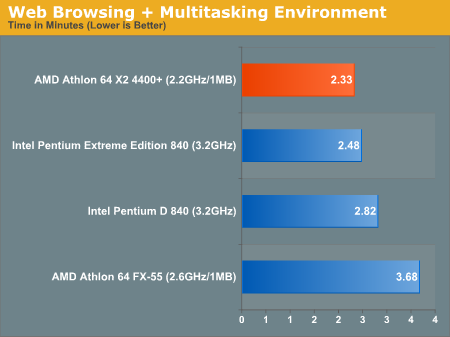AMD's dual core Opteron & Athlon 64 X2 - Server/Desktop Performance Preview
by Anand Lal Shimpi, Jason Clark & Ross Whitehead on April 21, 2005 9:25 AM EST- Posted in
- CPUs
Multitasking Scenario 3: Web Browsing
For this benchmark, we decided to switch things up a bit and keep Firefox as our foreground application while background tasks ran.The Firefox, iTunes and Newsleecher tasks from the first test scenario were also present in this one, plus we did the following:
Open Outlook, immediately import 130MB PST file and immediately switch app focus to Firefox.
We then recorded the total time required to import the new PST while Firefox was our foreground application. The results were very interesting:

Once again, we see some very good results from the dual core platforms; the Athlon 64 X2 4400+ manages to offer significantly better performance than the higher clocked FX-55, as do the two Intel platforms.










144 Comments
View All Comments
Opteron - Monday, June 20, 2005 - link
mikeshoup - Wednesday, June 15, 2005 - link
I think a better option for testing compiling speed would be to pass a -j argument to make when compiling FireFox, and tell it to run as many parallel operations as the processor can take threads. IE: -j2 for a dual core or ht cpufritz64 - Thursday, May 5, 2005 - link
I know what I will be getting after fall this year. Those numbers are impresive!jvarszegi - Friday, April 29, 2005 - link
So they're reproducible, but only in secret. And you knew, as usual, about mistakes you were making, but made them anyway to, um, make a valid comparison to something else that no one can verify. Nicely done. Whatever they're paying you, it's not enough.Ross Whitehead - Thursday, April 28, 2005 - link
Zebo -You are correct you can not reproduce them, but we can and have 10's of times over the last year w/ different hardware. I do not believe that because you cannot reproduce them discounts their validity but it does require you have a small amount of trust in us.
We have detailed the interaction of the application with the database. With this description you should be able to draw conclusions as to whether it matches the profile of your applications and database servers. Keep in mind, when it comes to performance tuning the most command phrase is "it depends". This means that there are so many variables in a test, that unless all are carefully maintained the results will vary greatly. So, even if you could reproduce it I would not recommend a change to your application hardware until it was validated with your own application as the benchmark.
The owner of the benchmark is not AMD, or Intel, or anyone remotely related to PC hardware.
I think if you can get beyond the trust factor there is a lot to gain from the benchmarks and our tests.
Reginhild - Thursday, April 28, 2005 - link
Wow, the new AMD dual cores blow away the "patched together" Intel dual cores!!I can't see why anyone would choose the Intel dually over AMD unless all the AMDs are sold out.
Intel needs to get off their arse and design a true dual core chip instead of just slapping two "unconnected" processors on one chip. The fact that the processors have to communicate with each other by going outside the chip is what killed Intel in all the benchmarks.
Zebo - Thursday, April 28, 2005 - link
Ross,How can I reproduce them when they are not available to me?
From your article:
" We cannot reveal the identity of the Corporation that provided us with the application because of non-disclosure agreements in place. As a result, we will not go into specifics of the application, but rather provide an overview of its database interaction so that you can grasp the profile of this application, and understand the results of the tests better (and how they relate to your database environment)."
Then don't include them. Benchmarking tools to which no one else has access is not scientific because it can't be reproduced so that anyone with a similar setup can verify the results.
I don't even know what they do. How are they imporatant to me? How will this translate to anything real world I need to do? How can I trust the mysterious company? Could be AMD for all I know.
MPE - Wednesday, April 27, 2005 - link
#134How can it be the best for the buck ? Unless you are seeing benchmarks from Anand that says so how could come to the conclusion?
At some tests the 3800+ was the worse performer while the X2 and PD where the best.
You are extrapolating logic from air.
Ross Whitehead - Wednesday, April 27, 2005 - link
#131"no mystery unreproducable benchmarks like Anand's database stuff."
It is not clear what you mean by this statement. The database benchmarks are 100% reproducable and are real life apps not synthetic or academic calcs.
nserra - Wednesday, April 27, 2005 - link
You are discussion price and it's not correct since intel goes from 2800 to 3200 and amd goes from 3500+ into 4000+ (i'm ignoring amd new model numbers, still based on older).I complete disagree the AMD model numbers, the should be = to single core, the should just had the X2.
The TRUE X2 will be more performer than opteron, by 2% to 5%.